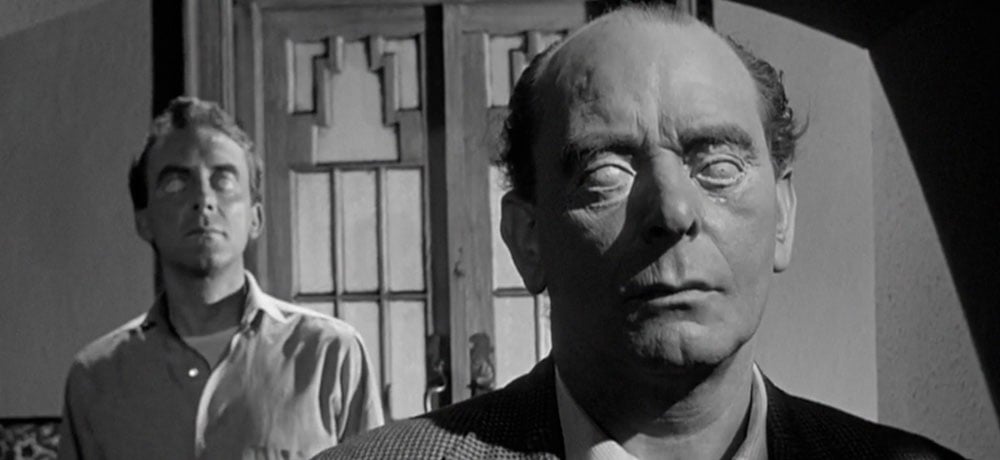


Okay, the title The Earth Dies Screaming (1964) may be all the way on the nose at the moment, but that shouldn’t discourage anyone from checking it out. After all, you have Hammer legend Terence Fisher directing a small cast through a post apocalyptic adventure with shiny robot aliens walking around. Sounds dodgy you say? It is! But it’s also only 62 minutes short, and in Fisher’s more than capable hands, becomes a taut little gasser.
Released by Twentieth Century Fox, this British production was hampered by an extremely low budget, at least according to critics; the truth is that The Earth Dies Screaming is a Z grade concept dragged up to a B by the sheer magnitude of Fisher’s talent, and a bigger budget may have erased its unique charm.
We open in the English countryside; things appear tranquil until: a train derails, a plane dovetails into a field, and a car crashes into a wall. Everywhere, people drop dead on the ground where they stood, no one exempt. This is before the credits even roll! When they’re done, we meet a not-so-young American test pilot, Jeff Nolan (Willard Parker – Kiss Me Kate), who scrounges through the quiet village looking for supplies or signs of life.
He is soon joined by other survivors in the village, including Peggy (Virginia Field – The Crystal Ball) and Quinn (Dennis Price – Kind Hearts and Coronets), a stuffy, aristocratic creep who feels empowered waving around his gun. When an older couple arrives (played by David Spenser and Anna Palk), the heady discussions arise, as to the what and why of their situation.
It is likely that the robotic spacemen parading slowly around the village are responsible for the genocide, and that everyone was gassed. Even more disturbing is a touch from one of the robots causes death, and later on, revival of said dead who don very painful looking white contacts. Can the gang stop the invasion before their 62 minutes run out?
The answer is a resounding ‘no’; in fact The Earth Dies Screaming is an interesting film in its disregard for standard structure: we begin mid-invasion, and we end as the survivors take off in a plane to look for others. There is neither setup nor payoff; simply a snapshot of a group trying to make sense of the (ostensible) end of the world. One could assume the low budget played a big part in trimming the fat (and the pre-fat and post-fat).
So what we’re left with is a bit of an oddity; hopping in medias res, we have to be willing to accept and fill in the blanks or move on. The odd thing is, and perhaps appropriate for an unforeseen disaster, is how little we’re given in the way of answers; screenwriter Harry Spalding (here as Henry Cross) seems to show no concern as to the why or what, but only the reactions of those it affects.
Those left behind are the concern, and it’s their job to ask the questions the screenplay refuses to answer: why were they attacked, by whom, and why do the robots need spacesuits? None of these queries are answered, but the game cast certainly does their best to serve the turmoil; the only one who feels out of place is American Parker, who strolls through his scenes with a smoke and a smirk for pretty much the whole running time. He seems to be in a different film than the others, one where the U.S. military will come rushing to the rescue at any moment. There really is no damsel here for him to save, so he mostly shrugs his shoulders when not ordering around his British compatriots. I do understand the financial reasoning to bring in an American actor, but it simply doesn’t work here; there is no time or need for cultural frisson in such a compact story.
Why The Earth Dies Screaming works as well as it does comes down to Fisher’s polish and acumen behind the camera; the first eight minutes are dialogue free, and he builds the tension before any human interaction even takes place. A precedent for the opening of Night of the Living Dead, to be certain, using the stillness to convey an unknown and unseen menace looming closer and closer. Once the cast is introduced however, he has his work cut out for him to move things along in the mostly inert picture; and when we do have some scenes of conflict peppered throughout, he maximizes each one with quick, tight action that pops because of not only the static before, but the charge he brings to them.
The Earth Dies Screaming sidesteps the usual allegorical tropes of the era to offer a straightforward telling of people trying to cling to whatever scraps of humanity are left behind. And if you’re okay without any kind of closure (or opening), it provides an hour to watch Terence Fisher work his magic, making a mountain out of a marketing molehill.
The Earth Dies Screaming is available on Blu-ray from Kino Lorber.
Next: Drive-In Dust Offs: CONTAMINATION (1980) Daily Dead's Official Podcast!
Daily Dead's Official Podcast! Daily Dead's Official Podcast!
Daily Dead's Official Podcast!